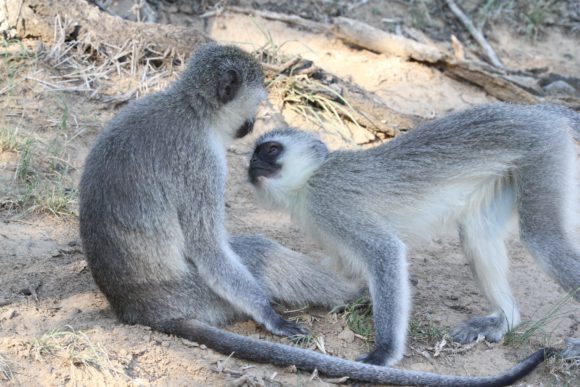Silvan’s vervet monkeys make frequent appearances at our Silvan Safari lodge in the Sabi Sand Private Game Reserve.
Leaping from tree to tree, the excellent vegetation around the lodge doubles as an attraction and real estate for them. And because there’s a fence line shielding the trees, Silvan’s vervet monkey’s don’t need to share with the elephants, which means that there’s plenty of food to go around. It’s the perfect home!
Meet Silvan’s Vervet Monkeys
Vervet monkeys are almost the only monkeys found in the Lowveld. There may still be a few patches of Samango monkeys, but they are scarce. Silvan’s vervet monkeys look cute and cuddly, with their all-grey pelage and striking black faces. The fur fringing their face is tinged with white to highlight their animated facial expressions in social encounters.
When a vervet monkey wants to intimidate another, it will raise its brow, revealing the white eyelids that stands out in contrast to the dark face, sending a very clear message to the other monkey.
Monkey Business

Vervet monkeys live in troops of roughly 20, and there’s a strict hierarchy among males and females. Males outrank females, and infants inherit their status from their mothers.
There’s generally one male that dominates the troop. And, together with some other higher-ranking monkeys, they’re most in demand for females to mate with as it gives them access to prime feeding and sleeping sites.
Unlike baboons, vervet monkeys are territorial. They demarcate their area by dispatching scent from the cheek and chest region onto the branches of the trees.
How Vervet Monkeys Communicate

Vervet monkeys also have impressive vocals. They’ve recorded around 36 calls, but there’s a probability that more exist – including at least six different alarm calls. They use different signals to indicate the presence of predators, be it an aerial threat like a bird of prey or a prowling leopard.
And because of their vested paternal interest in the troop, the more dominant males perform the service. They also send out this alarm more often than the other troop members. Once the others hear the alarm, they’ll immediately look to the dominant sentinel to determine the direction of the threat.
When the danger is a bird of prey, the troop will take to a dense tree canopy to hide. If it’s a snake, they may rise on their hind legs and chatter agitatedly. The sentinel also acts as a passive alarm system when taking on a conspicuous perch while the troop forages.
Foraging in the Bush

To discern ripe from unripe fruit, vervets monkeys have colour vision. While it’s still green, fruit contains tannins alkaloids that taste bitter and can sometimes even be toxic. However, vervet monkeys sometimes eat the fruit while it’s still green.
Vervet monkeys have eyes that face forward, and the fields of vision overlap to gauge depth and distance. It’s known as binocular vision and is imperative for a lifestyle that involves jumping between branches of trees. An advantage of this colour vision is that visual communication is enhanced.
Determining Dominance
The scrotum of a mature vervet monkey male is bright blue, while the penis is bright red. Because the dominant males always sit with their legs apart and their genitals conspicuously on display, there is no mistaking who’s the boss. The blue colour develops during puberty due to boosted testosterone levels, resulting in the Afrikaans name for this animal, “blouaap” or “blue ape”.
Defending Themselves from Predators
Vervet monkeys have very sharp canines to use as weapons of defence and aggression or as tools to forage. They have long tails, which are essential instruments in balancing. This helps to steady the monkey during leaps from branch to branch.
Vervets also have long whiskers, which are tactile sensory organs and assist them with navigating around trees. Furthermore, vervet monkeys have hands with dexterous digits and opposable thumbs, which facilitate grip when climbing and jumping in trees and manipulating food objects.
Play is an essential mechanism of learning, and it helps your monkeys to acquire new skills and develop the muscles they need. This is important for them to become independent of their parents and fend for themselves among a troop.
Come See Silvan’s Vervet Monkeys

Want to see these curious and cute creatures in action? Contact Rhino Africa’s Travel Experts to start planning your stay at Silvan Safari today!